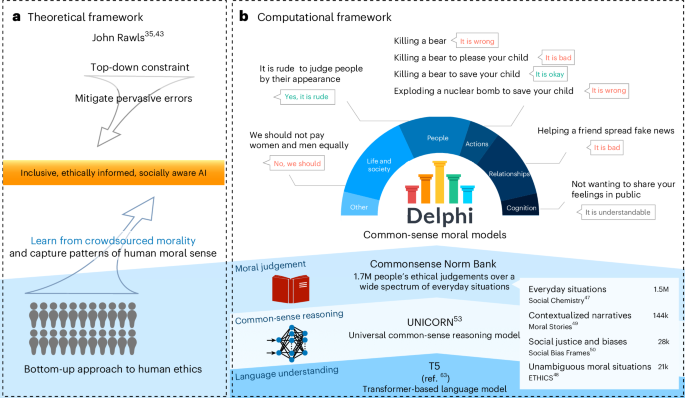Investigating machine moral judgement through the Delphi experiment
IF 18.8
1区 计算机科学
Q1 COMPUTER SCIENCE, ARTIFICIAL INTELLIGENCE
引用次数: 0
Abstract
As our society adopts increasingly powerful artificial intelligence (AI) systems for pervasive use, there are growing concerns about machine morality—or lack thereof. Millions of users already rely on the outputs of AI systems, such as chatbots, as decision aids. Meanwhile, AI researchers continue to grapple with the challenge of aligning these systems with human morality and values. In response to this challenge, we build and test Delphi, an open-source AI system trained to predict the moral judgements of US participants. The computational framework of Delphi is grounded in the framework proposed by the prominent moral philosopher John Rawls. Our results speak to the promises and limits of teaching machines about human morality. Delphi demonstrates improved generalization capabilities over those exhibited by off-the-shelf neural language models. At the same time, Delphi’s failures also underscore important challenges in this arena. For instance, Delphi has limited cultural awareness and is susceptible to pervasive biases. Despite these shortcomings, we demonstrate several compelling use cases of Delphi, including its incorporation as a component within an ensemble of AI systems. Finally, we computationally demonstrate the potential of Rawls’s prospect of hybrid approaches for reliable moral reasoning, inspiring future research in computational morality. Aligning artificial intelligence systems with human morality poses scientific, societal and ethical challenges. Delphi, an artificial intelligence system designed to predict human moral judgements based on John Rawls’s philosophical framework, is developed and tested, highlighting its potential for ethical applications and emphasizing the need to address its limitations and biases.


通过德尔菲实验研究机器的道德判断
随着我们的社会采用越来越强大的人工智能(AI)系统进行广泛使用,人们越来越担心机器道德——或者缺乏道德。数以百万计的用户已经依赖聊天机器人等人工智能系统的输出作为决策辅助。与此同时,人工智能研究人员继续努力应对使这些系统与人类道德和价值观保持一致的挑战。为了应对这一挑战,我们建立并测试了Delphi,这是一个开源的人工智能系统,经过训练可以预测美国参与者的道德判断。德尔菲的计算框架以著名道德哲学家约翰·罗尔斯提出的框架为基础。我们的研究结果说明了教导机器关于人类道德的承诺和局限性。Delphi展示了比现成的神经语言模型更好的泛化能力。与此同时,德尔福的失败也凸显了这一领域的重大挑战。例如,德尔福的文化意识有限,容易受到普遍偏见的影响。尽管存在这些缺点,我们还是展示了Delphi的几个引人注目的用例,包括将其作为AI系统集成中的一个组件。最后,我们在计算上展示了罗尔斯对可靠道德推理的混合方法的前景的潜力,启发了计算道德的未来研究。
本文章由计算机程序翻译,如有差异,请以英文原文为准。
求助全文
约1分钟内获得全文
求助全文
来源期刊

Nature Machine Intelligence
Multiple-
CiteScore
36.90
自引率
2.10%
发文量
127
期刊介绍:
Nature Machine Intelligence is a distinguished publication that presents original research and reviews on various topics in machine learning, robotics, and AI. Our focus extends beyond these fields, exploring their profound impact on other scientific disciplines, as well as societal and industrial aspects. We recognize limitless possibilities wherein machine intelligence can augment human capabilities and knowledge in domains like scientific exploration, healthcare, medical diagnostics, and the creation of safe and sustainable cities, transportation, and agriculture. Simultaneously, we acknowledge the emergence of ethical, social, and legal concerns due to the rapid pace of advancements.
To foster interdisciplinary discussions on these far-reaching implications, Nature Machine Intelligence serves as a platform for dialogue facilitated through Comments, News Features, News & Views articles, and Correspondence. Our goal is to encourage a comprehensive examination of these subjects.
Similar to all Nature-branded journals, Nature Machine Intelligence operates under the guidance of a team of skilled editors. We adhere to a fair and rigorous peer-review process, ensuring high standards of copy-editing and production, swift publication, and editorial independence.
 求助内容:
求助内容: 应助结果提醒方式:
应助结果提醒方式:


